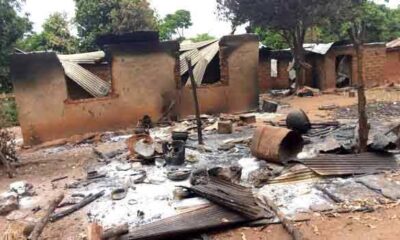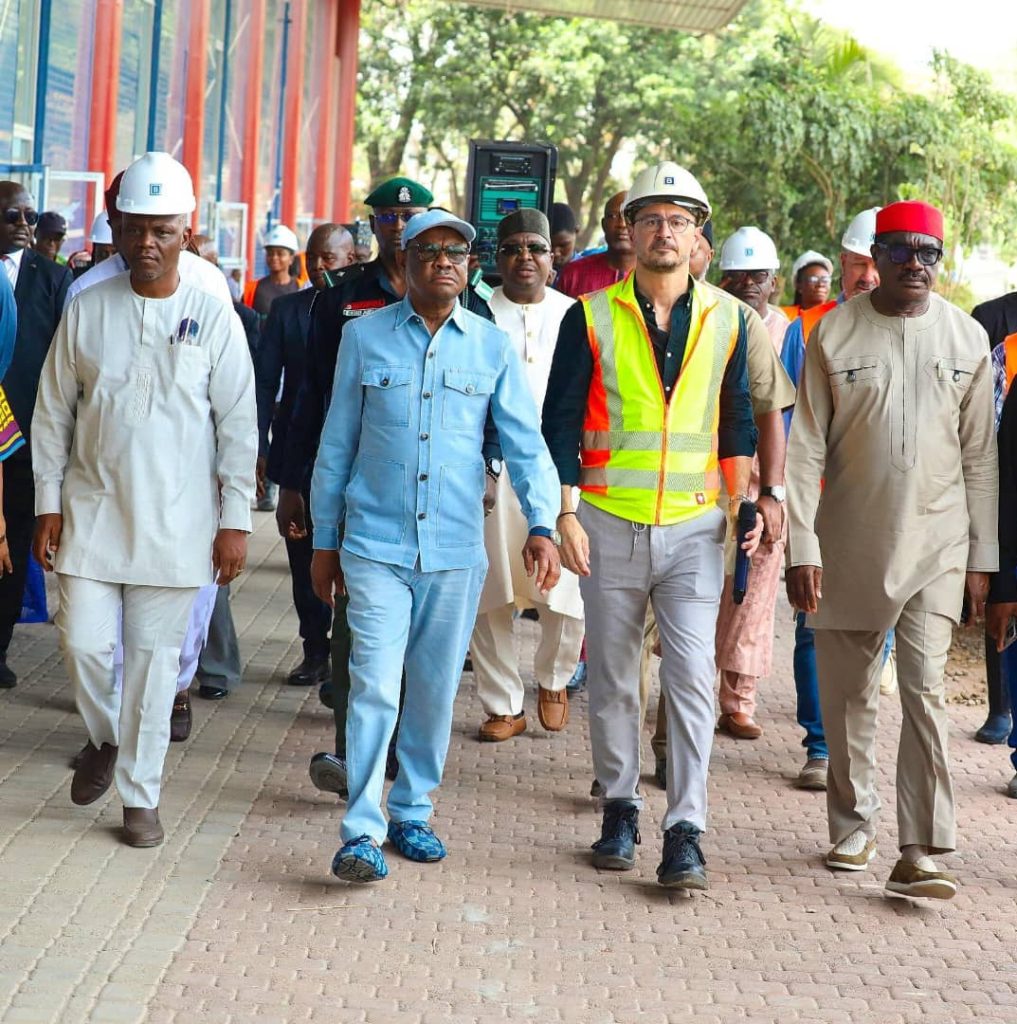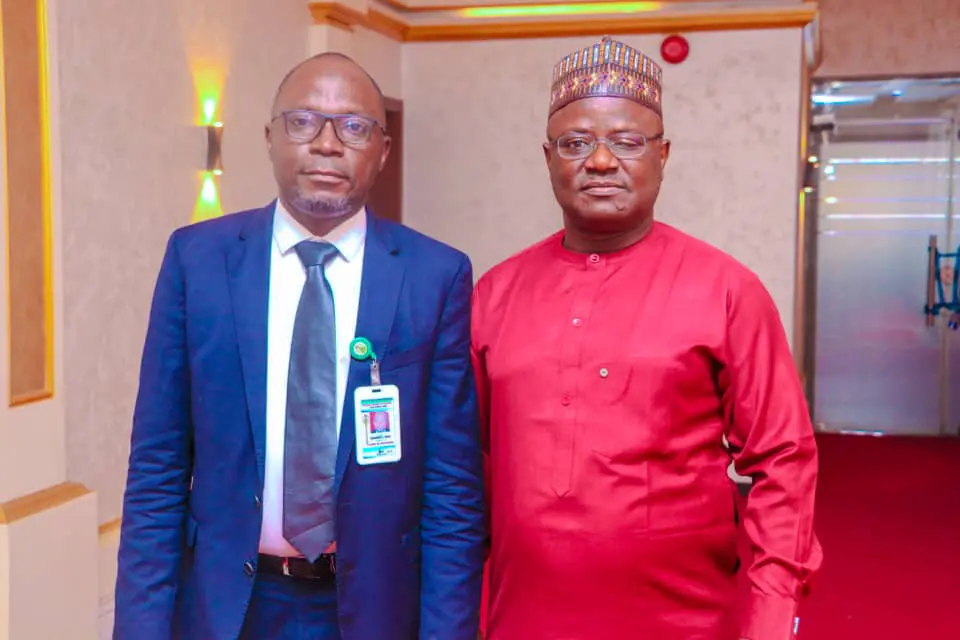Politics
Autonomy: FG, govs, LG chairs sign implementation agreement
Published
5 months agoon
By
Ekwutos BlogAutonomy: FG, govs, LG chairs sign implementation agreement
The Committee on Local Government Autonomy set up by the Federal Government has concluded its meetings and signed the technical document, which is expected to be transmitted to President Bola Tinubu soon.
The National President of the National Union of Local Government Employees, Hakeem Ambali, made this known in an interview with our correspondent on Tuesday.
In May, the Federal Government, represented by the Attorney-General of the Federation and Minister of Justice, Lateef Fagbemi, filed a lawsuit to challenge the governors’ authority to receive and withhold federal allocations meant for Local Government Areas.
The suit sought to prevent state governors from unilaterally dissolving democratically elected local government councils and establishing caretaker committees.
The AGF argued that the constitution mandated a democratically elected local government system and did not allow alternative governance structures.
On July 11, 2024, the Supreme Court gave a landmark judgment affirming the financial autonomy of the 774 LGs in the country, noting that governors could no longer control funds meant for the councils.
The seven-member Supreme Court panel, led by Justice Garba Lawal, ruled that it was illegal and unconstitutional for governors to manage and withhold LG funds.
The apex court also directed the Accountant-General of the Federation to pay LG allocations directly to their accounts, as it declared the non-remittance of funds by the 36 states unconstitutional.
Also, on August 20, the Federal Government instituted a 10-member inter-ministerial committee to implement the Supreme Court’s ruling on local government autonomy.
The committee members include the Minister of Finance & Coordinating Minister of the Economy, Wale Edun; Attorney-General of the Federation & Minister of Justice, Lateef Fagbemi SAN; Minister of Budget & Economic Planning, Abubakar Bagudu; Accountant-General of the Federation; Oluwatoyin Madein and the Governor of the Central Bank of Nigeria, Olayemi Cardoso.
Others are the Permanent Secretary, Federal Ministry of Finance, Mrs Lydia Jafiya, the Chairman, Revenue Mobilisation Allocation & Fiscal Commission, Mohammed Shehu, and representatives of state governors and the local governments.
The committee’s primary goal is to ensure that local governments are granted full autonomy, allowing them to function effectively without interference from state governments.
Speaking to our correspondent on Tuesday, Ambali said, “The committee has held its final meeting and we have signed the technical document which will be transmitted to Mr President so by November end. It is expected that states will receive their allocations from FAAC. Also, I can tell you that the President is eager to receive that document. The committee worked within the time frame that was provided.”
Meanwhile, the National Union of Teachers has expressed fears about the capacity of LGs to pay the N70,000 new minimum wage to primary school teachers.
The NUT’s apprehension is hinged on the failure of the councils to implement the former N30,000 minimum wage.
Findings by our correspondent show that some LG workers in Nasarawa, Enugu, Zamfara, Borno, Yobe, and Kogi states, among others, have remained on the N18,000 minimum wage, which was approved in 2011.
However, the inability of the councils to implement the minimum wage has been blamed on the failure of the government to fully implement the LG autonomy.
Data obtained from the NUT revealed that teachers in LG primary schools were not paid the former minimum wage.
In Enugu State, for instance, LG workers were exempted from benefitting from the minimum wage though the state workers enjoyed the minimum wage salaries.
Also, Abia, Adamawa, Bauchi, Nasarawa, Kogi, Sokoto, Taraba, Yobe, Zamfara, Imo and Gombe States did not implement the old minimum wage for teachers at both state and local levels.
Confirming this, the General Secretary of the National Union of Teachers, Dr. Mike Ene said, “I can tell you that some states didn’t even implement the N18,000 minimum wage for teachers at the local level. Some governors refused to pay stating that the teachers are under the employment of the local governments.
“There should be no form of segregation when it comes to the implementation of the minimum wage. We all go to the same market. There is no specific market for local government workers. However, we commend all the governors who have come out to say that the minimum wage will be implemented across the board.
“Also, the NLC has vowed to shake the country by December should state governments fail to implement the minimum wage so I can tell you that the move by the NLC will force things into play.”
But NULGE president Ambali assured that the minimum wage would be implemented across the board when the LG autonomy commences.
“Over the years, governors have had one excuse and that is the fact that they always claimed that LGs are autonomous so they can’t negotiate minimum wage on behalf of LG workers. But the truth is that LGs were never autonomous during those periods.
“However, during the negotiation of the new minimum wage, the President brought in representatives of ALGON (Association of Local Government of Nigeria) to also negotiate and with the LG autonomy coming into play, that will be settled. The NLC has also given an ultimatum of December for all states as regards the payment of the minimum wage,” he added.
You may like


PRESIDENT TINUBU CONDEMNS LATEST ATTACK IN PLATEAU, CHARGES GOVERNOR MUTFWANG WITH RESOLVING UNDERLYING COMMUNAL ISSUES


Wike hails 95% implementation of FCT 2024 budget, unveils key projects


Benue Govt moves to block Peter Obi’s visit amid Alia’s defection rumours


Nasarawa Assembly confirms new clerk, deputy


Rivers: Refund N300m Fubara gave you – Ibas tells NBA


War: Ukraine loses 235 soldiers in 24 hours
Politics
Wike hails 95% implementation of FCT 2024 budget, unveils key projects
Published
1 hour agoon
April 14, 2025By
Ekwutos Blog
The Minister of the Federal Capital Territory (FCT), Barr. Ezenwo Nyesom Wike, has announced a landmark 95 percent implementation of the 2024 statutory budget, describing the achievement as unprecedented in the history of the FCT.
Wike made this known during a media briefing after inspecting several critical infrastructure projects across the Territory, including major roads at Life Camp and Katampe, as well as the ongoing renovation of the International Conference Centre, Abuja.
“I can tell you we’ve done not less than 95 percent of the budget implementation. That is historic. It has never happened before. And if you look at the projects there, you will see that there is no project that is in the 2024 budget that we have not touched,” he stated.
He attributed the progress to the National Assembly’s decision to extend the lifespan of the 2024 FCT statutory budget until June 2025, which he said enabled the Administration to sustain funding and accelerate delivery on major projects.
Wike also revealed that the 2025 statutory budget had already been submitted to the National Assembly and expressed hope that its timely passage would maintain the current momentum and support the completion of key infrastructure across the FCT.
During the tour, the Minister expressed satisfaction with the pace and quality of work, commending contractors for adhering to timelines and maintaining high standards.
Among the projects visited was the 4-kilometer six-lane dual carriageway linking Life Camp Junction to Ring Road III, currently under construction by Julius Berger. Once completed, the road will significantly improve connectivity between the districts of Kado, Karmo, Gwarimpa I, Dape, Ido-Gwari, Saburi, and Dei-Dei.
Another major project nearing completion is the access road from Nnamdi Azikiwe Expressway (by N16) to the Judges’ Quarters in Katampe District. This route will also connect the N20 (Wole Soyinka Way) in Jahi District with Katampe and Maitama, enhancing mobility in the area.
Wike expressed particular delight at the progress of the International Conference Centre renovation, which he described as rapidly advancing.
“These projects will be inaugurated by Mr. President during his second-year anniversary celebrations. We have gone to the International Conference Centre, which is almost ready. The first phase of the N5 will also be ready by the end of May,” he said.
Politics
Benue Govt moves to block Peter Obi’s visit amid Alia’s defection rumours
Published
2 hours agoon
April 14, 2025By
Ekwutos Blog
The Benue State Government is reportedly making moves to block a planned visit by Labour Party presidential candidate in the 2023 general election, Mr Peter Obi, to camps housing Internally Displaced Persons (IDPs) in the state.
Obi, whose post-election activities have prominently included humanitarian outreach to victims of violence across the country, was said to have planned a visit to some of the IDP camps in Benue.
The former Anambra State governor, in recent weeks, visited IDP camps in Plateau, Southern Kaduna and Nasarawa states, meeting with displaced families, donating relief materials and advocating for urgent government intervention.
His visit to Plateau State drew national attention after he held talks with Governor Caleb Mutfwang and visited victims of herdsmen attacks.
According to reliable sources, Obi’s team had reached out to the Benue State Emergency Management Agency (BSEMA) through its Executive Secretary, Sir James Iorpuu, to officially notify the agency and seek access to designated camps for the visit.
However, it appears the move has sparked a political storm within Benue’s corridors of power.
Top government officials reportedly advised Governor Alia against granting Obi access to the IDP camps, citing political undertones.
The visit, they argued, could be perceived as a calculated move by former Governor Samuel Ortom, a staunch supporter of Peter Obi during the 2023 presidential election, to revive his political relevance and embarrass the current administration.
Beyond the Ortom factor, sources also revealed that the decision to stop Obi’s visit was influenced by wider political calculations.
“It is believed that allowing Obi access at this time could fuel ongoing speculations that Governor Alia is considering leaving the All Progressives Congress (APC) amid tensions with some national leaders of the party.
“The governor is very conscious of his relationship with the Presidency and party hierarchy. Allowing Obi’s visit would not only trigger local political drama with Ortom but might also be interpreted in Abuja as a subtle alignment with the opposition at a time when Alia is battling internal party issues. This is not the kind of message he wants to send to the President.
“Such an association, especially with a high-profile opposition figure like Obi, could be politically damaging for Alia, who has been working to consolidate his hold on the state and maintain good standing with President Bola Tinubu’s administration,” a source told Ekwutosblog on Monday.
It would be recalled that in the February 25, 2023 presidential poll, Obi pulled a stunning performance in Benue State, securing over 308,000 votes, a figure that shocked many given the dominance traditionally enjoyed by the two major parties – APC and PDP.
His victory in the state was largely attributed to the support of Ortom and a groundswell of youth-driven, faith-based and middle-class backing.
Following this backdrop, sources disclosed that Governor Alia was convinced by his inner circle to forestall Obi’s visit to avoid reigniting political rivalries or offering Ortom and the Labour Party a platform to reassert influence in the state.
As a result, the governor reportedly instructed his Chief Press Secretary, Tersoo Kula, to issue a public statement cautioning against what it described as “unapproved high-profile visits” to the state.
“For anyone considering a visit to Benue State without the Governor’s knowledge, it is imperative to reconsider such plans, as the safety and security of individuals in this regard cannot be guaranteed,” he warned.
Though the statement fell short of directly naming Peter Obi, insiders confirmed that it was a veiled warning aimed at dissuading the former presidential candidate from proceeding with his proposed outreach.
One government source, speaking anonymously, said, “The governor is not comfortable with Obi’s visit, especially with the political undertones it carries.
“The camps are a sensitive issue and we cannot allow anyone to politicise the suffering of our displaced people.”
As of the time of filing this report, neither Obi’s camp nor the Labour Party has issued an official statement regarding the restriction.
However, a source close to the former governor disclosed that the visit was purely humanitarian and part of Obi’s ongoing national outreach to communities affected by violence and displacement.
Politics
Nasarawa Assembly confirms new clerk, deputy
Published
3 hours agoon
April 14, 2025By
Ekwutos Blog
The Nasarawa State House of Assembly resumed plenary on Monday after the Sallah break, confirming Mr. Ibrahim Abdulazeez Musa as the substantive Clerk of the House.
The confirmation was announced by the Speaker, Dr. Danladi Jatau, during proceedings in Lafia.
Musa had been serving in an acting capacity since December 6, 2023, following the ill health of the former Clerk, Mr. Ego Maikeffi Abashe, who passed away on March 1, 2025.
In the same session, the Speaker also announced the appointment of Mr. Paul Okugya as the Deputy Clerk of the House. Prior to his new role, Okugya served as Director of Protocol.
The Speaker congratulated both appointees on their elevation and wished them success in their new responsibilities.
Jatau also led members of the Assembly in observing a minute of silence in honour of the late Clerk, Mr. Abashe.
Meanwhile, two bills were introduced for first reading during the plenary session.
The first, a private member bill, titled “A Bill for a Law to Establish Lafia General Hospital and Other Related Matters Thereto,” was presented by Hon. Solomon Yakubu Akwashiki, who represents Lafia Central Constituency.
The motion was seconded by Barr. Esson Mairiga, member representing Lafia North Constituency.
The second bill on the order paper was “A Bill for a Law to Amend the Re-enacted Nasarawa State House of Assembly Service Commission Law 2023 and Other Incidental Matters Thereto.”
The motion for first reading was moved by the House Leader, Hon. Suleiman Azara, and seconded by the Minority Leader, Hon. Luka Iliya Zhekaba.
The bill has been scheduled for second reading on April 29, 2025, while deliberation on Hon. Akwashiki’s bill is slated for April 28, 2025.

PRESIDENT TINUBU CONDEMNS LATEST ATTACK IN PLATEAU, CHARGES GOVERNOR MUTFWANG WITH RESOLVING UNDERLYING COMMUNAL ISSUES

Wike hails 95% implementation of FCT 2024 budget, unveils key projects

Benue Govt moves to block Peter Obi’s visit amid Alia’s defection rumours
Trending

 Trending6 months ago
Trending6 months agoNYA demands release of ‘abducted’ Imo chairman, preaches good governance
- Business6 months ago
US court acquits Air Peace boss, slams Mayfield $4000 fine

 Politics6 months ago
Politics6 months agoMexico’s new president causes concern just weeks before the US elections
- Entertainment6 months ago
Bobrisky transferred from Immigration to FCID, spends night behind bars
- Entertainment6 months ago
Bobrisky falls ill in police custody, rushed to hospital

 Politics6 months ago
Politics6 months agoRussia bans imports of agro-products from Kazakhstan after refusal to join BRICS

 Politics6 months ago
Politics6 months agoPutin invites 20 world leaders
- Politics1 year ago
Nigerian Senate passes Bill seeking the establishment of the South East Development Commission.

